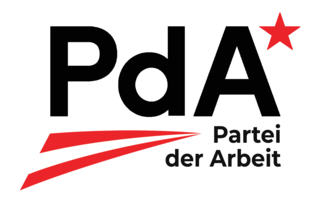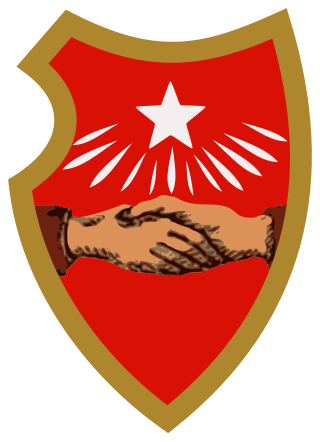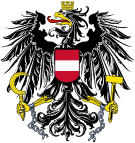
The Communist Party of Austria is a communist party in Austria. Established in 1918 as the Communist Party of German-Austria (KPDÖ), it is one of the world's oldest communist parties. The KPÖ was banned between 1933 and 1945 under both the Austrofascist regime and the Nazi German administration of Austria after the 1938 Anschluss.
In the fourteen years the Weimar Republic was in existence, some forty parties were represented in the Reichstag. This fragmentation of political power was in part due to the use of a peculiar proportional representation electoral system that encouraged regional or small special interest parties and in part due to the many challenges facing the nascent German democracy in this period.

The Austrian provincial parliaments are the unicameral legislatures of the nine Austrian provinces, according to the Constitution of Austria deciding in all matters unless explicitly subject of federal legislation. On federal level the provincial parliaments are represented in the Federal Council.

The Alliance for the Future of Austria is a right-wing populist, national conservative political party in Austria.

The Marxist–Leninist Party of Germany is a communist political party in Germany. It was founded in 1982 by members of the Communist Workers Union of Germany and is one of the minor parties in Germany.

The Communist Workers' Party of Germany was an anti-parliamentarian and left communist party that was active in Germany during the Weimar Republic. It was founded in 1920 in Heidelberg as a split from the Communist Party of Germany (KPD). Originally the party remained a sympathising member of Communist International. In 1922, the KAPD split into two factions, both of whom kept the name, but are referred to as the KAPD Essen Faction and the KAPD Berlin Faction.

The Austrian Civil War of 12–15 February 1934, also known as the February Uprising or the February Fights, was a series of clashes in the First Austrian Republic between the forces of the authoritarian right-wing government of Engelbert Dollfuss and the Republican Protection League, the banned paramilitary arm of the Social Democratic Workers' Party of Austria. The fighting started when League members fired on the Austrian police who were attempting to enter the Social Democrats' party headquarters in Linz to search for weapons. It spread from there to Vienna and other industrial centres in eastern and central Austria. The superior numbers and firepower of the Austrian police and Federal Army quickly put an end to the uprising. The overall death toll is estimated at about 350.

The Communist Party of Germany is an anti-revisionist Marxist-Leninist communist party in Germany. It is one of several parties which claim the KPD name and/or legacy. It was founded in Berlin in 1990. The party is also commonly referred to by the name KPD-Ost to differentiate it from other parties with the same name, most prominently the historical Communist Party of Germany.

The Burma Workers Party, until 1958 the Burma Workers and Peasants Party, was a communist party in Burma, formed on 8 December 1950 by leftist elements of the Socialist Party. In December 1962 it merged with the People's Comrade Party to form the United Workers Party. In March 1964, it was among the many parties banned by decree of the Revolutionary Council.
The Jewish Social Democratic Party "Poale Zion", later renamed Jewish Socialist Workers Party Poale Zion in German Austria in the fall of 1921 and Jewish Communist Party of Austria, was a political party in Austria. The party published Freie Tribune 1919–1921. The party was part of the international Jewish Communist Union, the left wing of the Labour Zionist Poale Zion movement.
The political parties used numerous campaign posters in the 2008 Austrian legislative election.

The Team Stronach for Austria was a Eurosceptic, right-wing populist political party in Austria founded by and named after Austrian-Canadian businessman Frank Stronach. It was dissolved in August 2017.

The Social Democratic Party of Austria is a social-democratic political party in Austria. Founded in 1889 as the Social Democratic Workers' Party of Austria and later known as the Socialist Party of Austria from 1945 until 1991, the party is the oldest extant political party in Austria. Along with the Austrian People's Party (ÖVP), it is one of the country's two traditional major parties. It is positioned on the centre-left on the political spectrum.

The Party of Labour of Austria is a communist party in Austria. PdA was founded on 12 October 2013 by the Communist Initiative, a Marxist-Leninist breakaway faction of the Communist Party of Austria (KPÖ), who were dissatisfied with the party's ideological orientation.

The Independent Social Democratic Party of Germany was a short-lived political party in Germany during the German Empire and the Weimar Republic. The organization was established in 1917 as the result of a split of anti-war members of the Social Democratic Party of Germany (SPD), from the left of the party as well as the centre and the right. The organization attempted to chart a course between electorally oriented reformism on the one hand and Bolshevist revolutionism on the other. After several splits and mergers, the last part of the organization was terminated in 1931 through merger with the Socialist Workers' Party of Germany (SAPD).
Since its foundation in 1889, the Social Democratic Party has often been one of the main political forces in Austria. At the start of the First World War it was the strongest party in parliament, and on the ending of that war in 1918 the party leader Karl Renner became chancellor of the First Republic. The party lost power in 1920, but retained a strong base of support in the capital Vienna. A period of rising political violence culminated in the banning of the Social Democratic Party under the Austrofascist dictatorship (1934–38).

Legislative elections were held in Austria on 29 September 2019 to elect the 27th National Council, the lower house of Austria's bicameral parliament. The snap election was called in the wake of the Ibiza affair in May, which caused the resignation of Vice Chancellor Heinz-Christian Strache and the collapse of the governing coalition of the Austrian People's Party (ÖVP) and Freedom Party of Austria (FPÖ). The government subsequently lost a motion of no confidence in parliament, before ÖVP Chancellor Sebastian Kurz was replaced by non-partisan Brigitte Bierlein on an interim basis.

Team HC Strache – Alliance for Austria is a political party in Austria. It was founded in December 2019 under the name The Alliance for Austria by three former members of the Freedom Party of Austria (FPÖ) led by Karl Baron. In February 2020, former FPÖ leader Heinz-Christian Strache confirmed he would run for the DAÖ in the 2020 Viennese state election. The party subsequently promoted Strache to federal party chairman and adopted its current name. The party failed to win seats in the election.
Kommunistische Partei may refer to:
Ernst Aust was a German communist political activist and journalist. He was the founder of the Communist Party of Germany/Marxist–Leninists (KPD/ML).


















